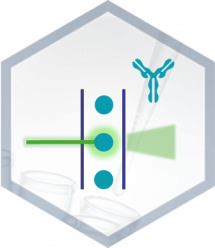
Monoclonal Antibody for Flow Cytometry (FC)
Phage Display & Lymphocyte Hybridization Technologies
BIOTEM has developed a fully recognized know-how in the discovery, the generation and the production of monoclonal antibodies.
In addition since 1980 and with more than 150 projects per year, the team has a well established expertise in challenging targets (membrane protein, small molecule, conserved target, etc.).
Monoclonal antibody development and production is mainly based on 2 technologies: Hybridoma or Phage Display (recombinant antibodies).
Each project is based on several crucial phases at the end of which the customer has the opportunity to test the biological material and decide to continue the project (Go/ No Go Milestones).
The company offers to implement its Flow Cytometry (FC) platform for antibody screening and identification, from the very earliest stages of development. Unlike other platforms, FC can be implemented at essential stages of development to ensure the functionality of selected antibodies.

BIOTEM does not claim any intellectual properties or any other rights on the developed antibodies.
Advantages of the Flow Cytometry Platform:
- Fast & Reliable: an integrated platform in 96-well plate format
- Antibody evaluation at key stages of the development
- Suitable for GPCR, conformational epitopes/ membrane proteins, etc.
- Personalized assistance
- Client Testing throughout the Program (Go/ No Go Milestones)
Project
Specifications
1. Project Specifications
For each case, our team explores with the client the challenges of the project and defines the specifications together.
- Target of interest : membrane protein, intracellular protein, peptide, small molecule, post-translational modifications, etc.
- Applications : Cytometry/FACS, functional tests, diagnostic or therapeutic applications, etc.
- Special features : Available material (protein, cell line, etc.), specificity, deadlines, etc.
Taking into account these multiple parameters, BIOTEM proposes tailor-made strategies to meet the client's needs and guarantee the success of the project.
Immunization
mouse & rat
2. Immunization
To meet each precise demand and client’s specifications, BIOTEM relies on a wide range of proven immunization strategies to obtain high affinity and specificity antibodies. Specific methods are developed to ensure that the appropriate immune response is achieved. The client will also have the possibility to test the sera in his/her application. At the end of this phase BIOTEM will be able to propose a contract with guaranteed results.
- Protein Immunization: From the production of the recombinant protein production (transient transfection in CHO) to its preparation for immunization.
- Peptide Immunization: BIOTEM has the experience and know-how to optimally integrate all the parameters and constraints of immunogenic peptides design. Immunization with peptides is a relevant strategy for the generation of antibodies directed against selected epitopes. This approach also reduces the need for sophisticated protein preparations for immunization.
- Genetic immunization: Genetic immunization is one of the strategies of choice for the development of monoclonal antibodies directed against membrane proteins, for example. This technique involves the use of messenger RNA (mRNA) or complementary DNA (cDNA) encoding target proteins to stimulate the production of specific antibodies against these proteins. This approach can promote the production of high-affinity, high-specificity antibodies, which are essential for effective targeting of membrane proteins.
- Other - Cell immunization or other methods: Appropriate solutions when immunogens are not available or in the case of toxic targets.
- Non-exhaustive list
Library &
Phage Display
3. Immune Library Construction & Phage Display
Unlike naive or synthetic libraries, BIOTEM proposes the construction of an immune library, in scFv or VHH format, focused on the target of interest combined with high throughput antibody screening (or bio-panning) by phage display. This optimizes the chances of success in obtaining high affinity and high specificity antibodies. BIOTEM also offers an exclusive synthetic VHH library as an alternative to immunization.
- Selection of a large number of scFv candidates (VH + VL) or VHH (single domain)
- Optimized screening with different stringency conditions (direct, competitive, subtractive, etc.)
- Antibody evaluation by Flow Cytometry and selection of the clones
- Immediate and automatic access to sequences (single clones - redundancy analysis)
- Production, Purification and Characterization of candidates (reactivity, affinity, etc.)
At the end of this phase the client will have the opportunity to test the scFv / VHH and select the best candidates for the reformatting phase in full Ig or other formats.
Reformatting
& Engineering
4. Reformatting & Antibody Engineering
This step allows the transition from scFv/VHH to full immunoglobulin format (or orther formats : scFv-Fc, VHH-Fc, etc.) thanks to a fully integrated platform for recombinant antibody production in mammalian cells (CHO). Learn more
- Several Isotypes & Species
- Sequence Optimization
- Antibody Engineering (Isotype, mutations, Fc-fusion protein, Bispecific antibodies, Fab, etc.)
- Generation of variants (Chimerization, humanization,etc.)
- Recombinant Antibody Production & Purification (pilot study)
- Antibody Characterization by Flow Cytometry
Sending of the pilot lot for client testing and selecting the final candidate(s) for large scale production.
Production &
purification
5. Antibody Production & Purification
BIOTEM provides its platform for recombinant antibody production by transfection into CHO cells for large-scale production. Learn more
- From milligram to several grams
- « Low endotoxin » Conditions(< 10 EU/mg ; down to < 1 EU/mg)
- Serum-free System
- Quality Control (concentration, purity, affinity, aggregation, stability, etc.)
- Antibody Evaluation by Flow Cytometry
Project
Specifications
1. Project Specifications
For each case, our team explores with the client the challenges of the project and together, they define the specifications.
- The target of interest : membrane protein, intracellular protein, peptide, small molecule, post-translational modifications, etc.
- Applications : Cytometry/FACS, functional tests, diagnostic or therapeutic application, etc.
- Specifications : Available material (protein, cell line, etc.), specificity, deadlines, etc.
Taking into account these multiple parameters, BIOTEM proposes tailor-made strategies to meet the client's needs and guarantee the success of the project.
Immunization
mouse & rat
2. Immunization
To meet each precise demand and client’s specifications, BIOTEM relies on a wide range of proven immunization strategies to obtain high affinity and specificity antibodies. Specific methods are developed to ensure that the appropriate immune response is achieved. Serum will be tested by Flow Cytometry and ELISA. The client will also have the possibility to test the sera in his/her application. At the end of this phase BIOTEM will be able to propose a contract with guaranteed results.
- Protein Immunization : From the production of the recombinant protein (transient transfection in CHO) to its preparation for immunization
- Peptide Immunization : BIOTEM has the experience and know-how to optimally integrate all the parameters and constraints of the design of immunogenic peptides. Immunization with peptides is a relevant strategy for the generation of antibodies directed against selected epitopes. This approach also reduces the need for sophisticated protein preparations for immunization.
- Genetic immunization: Genetic immunization is one of the strategies of choice for the development of monoclonal antibodies directed against membrane proteins, for example. This technique involves the use of messenger RNA (mRNA) or complementary DNA (cDNA) encoding target proteins to stimulate the production of specific antibodies against these proteins. This approach can promote the production of high-affinity, high-specificity antibodies, which are essential for effective targeting of membrane proteins.
- R.A.D® Protocol (Exclusive) : Rapid Antibody Development allows the fast development of hybridomas in less than a month (immunization, fusion and screening included) and offers the possibility to work on highly conserved targets.
- S.S.I. Protocol (Exclusive) : Small Size Immunogen, optimized for small targets (< 30 kDa).
- Subtractive immunization : These techniques are particularly useful for the generation of antibodies against epitopes that are poorly immunogenic and/or sharing a high degree of homology
- Other - Small molecules (haptens), Genetic, cellular or in vitro immunization : Suitable solutions when immunogens are difficult to obtain or in the case of toxic targets.
Fusion &
Screening
3. Lymphocyte Hybridization & Hybridoma Screening
Depending on the Phase I results, the client will decide whether to launch subsequent phase or not (Go / No-Go). With its expertise, BIOTEM offers optimized screening methods to identify the best hybridomas (oligoclonal stage).
- Fusion/ Lymphocyte Hybridization: Fusion of the lymphocytes with myeloma cells to produce hybridomas (immortalization)
- Antibody Screening: A crucial step in the project to isolate reactive and specific clones. The methods used are adapted for each project according to the client's specifications (standard, competitive, multiple screening, etc.). Several screening rounds are generally carried out. BIOTEM offers Flow Cytometry screening.
- Confirmations: The positive clones from the screening are then retested by Flow Cytometry and ELISA if necessary. At this stage the client will have the possibility to test the positive clones
- Cell Bank: After the tests performed by the client, the selected hybridomas are secured.
Cloning
Hybridomas
4. Hybridoma Cloning
The selected hybridomas are then stabilized by limiting dilution. This step is necessary to obtain monoclonal lines. Functionality will be checked by Flow Cytometry before a cell bank (cryotubes) is validated.
The client will have the option to receive intermediate supernatants to test in his/her application.
The cryogenic vials can be transferred to the client or stored in secure containers at BIOTEM for future productions. (Learn more).
Production &
purification
5. Antibody Production & Purification
BIOTEM offers different solutions for the production and purification of antibodies, from pilot batch to large-scale. Productions are systematically offered in Low Bovine IgG conditions and can be Low Endotoxin (< 10 EU/mg; even < 1 EU/mg) on request.
- In vitro Production : Flask, HYPERFlask®, CELLine, Bioreactors, etc.
- Purifications : Affinity chromatography, precipitation, size exclusion, etc. Learn more
- Evaluation by Flow Cytometry
Additional services such as antibody characterization (sequencing, affinity, etc.) or modification (coupling, fragmentation, etc.) are also available.


To access the document, please fill the form

